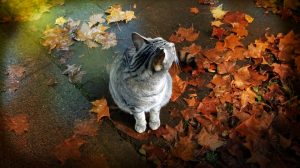You and your pet had a great summer. Many days were spent at the park, the beach, or camping in the wilderness. It has now come to an end and fall and winter are on their way. You’ve put away the camping gear and brought out your winter clothes. But what can you do for your pet? How can you prepare them for the change of seasons that are on the way? Read below to find out.
Changes in Weather Patterns Can Affect Your Pets
Both dogs and cats can react strongly to changes in weather patterns. Many animals are sensitive to barometric pressure (the pressure of the earth’s atmosphere). If a storm is on the way and you have a sensitive pet, provide a safe place for them to hide. Put them in a kennel or crate in a quiet area of the house so they don’t panic and run away or injure themselves.
Your pet’s appetite may change during fall and wintertime. Dogs and cats often eat less during the summer months and increase their food intake during the colder months. When it is hot and humid outside, they may not feel like eating. During winter, the change in temperature and activity level may increase their appetite as an attempt to keep them warm.
The below is quoted from a research abstract on ScienceDaily.com.
“The study found that cats ate approximately 15% less food during summer, and the vets have concluded that the extra effort to keep warm in winter and the temptation to rest during hot summer days contributed to the swing in activity levels during the year.”
You can read the full article here: Cats Found to Eat More in Winter.
It is also possible that your pet has an illness that is affecting their appetite, rather than the change in weather. If they are losing weight and don’t seem to be feeling well, you may want to take them to your veterinarian for a checkup. The issue could be a bad tooth that is causing pain when they eat, kidney or liver disease causing nausea, an infection, or even cancer.
To be prepared for any health issues that may befall your much-loved, four-legged family member during their lifetime, be sure to purchase pet insurance. For $30-$70 per month, you can assure that you will be able to provide any medical care that they may need in the event of an unexpected illness or accident.
Keeping Your Pet Comfortable
If you feel like snuggling up in a warm blanket, your pet most likely does too. And when you bundle up to go outdoors because it is bitter cold and windy, bundle up your pet. Unless they have a full, dense winter coat, they will be more comfortable with an extra layer on just like you are. A fleece pet sweater will help them enjoy going outside and help maintain their body temperature.
This article on VetStreet.com describes why some dog breeds do need to have sweaters or coats put on them during colder months: Do Any Dogs Really Need Sweaters or Coats?
In addition to giving them a warm, comfortable place to be during the day such as a well-insulated dog house with blankets, outdoor dogs (and cats) should be brought indoors at night.
Keep Up with Flea and Tick Prevention
Icy cold weather with five inches of rainfall does not necessarily eradicate all pests in the environment such as fleas and ticks. There may be not as many around to jump onto your dog or cat and take up residence in their skin and fur, but they can still be present and can infect your pet. Don’t start slacking on the flea and tick preventative during these months! There may be fewer bugs around, but they are never completely gone.
If You Get the Winter Blues, Your Pet May Be Affected Too
During the wintertime, some adults can experience mild to moderate depression. Called “Seasonal Affective Disorder,” it is believed that less hours of sunlight during the day lead to biochemical changes in the body that affect mood and behavior. You may become lethargic, unmotivated, have changes in appetite, and feel a lack of pleasure when doing things you used to enjoy.
If this happens to you, it may affect your pet as well. When you start lounging on the couch for hours on end instead of getting outside and doing things you normally do, your pet will notice the change in routine. This may cause them to experience a change in their normal behavior, too. In other words, they may start acting a little depressed.

Take care of yourself so you can take even better care of your pets. You deserve the best, and they do too!
PetMD.com describes depression in dogs this way: “Generally speaking, when we speak of a depressed dog we are referring to a dog who is exhibiting a change in behavior that manifests as decreased interest in normal activities or a change in interaction with his family.”
You can learn more here: Can Dogs Get Depressed?
To keep your pets happy even when you may not be, try to stick to a routine that they can count on and make sure to express affection like you normally do. That may boost your spirits a bit as well. Look forward to spring when both of you will most likely be back to your normal selves.
Enjoy Your Pet Year-Round
Above are some basic tips on how to prepare your pet for the cooler months beginning in September-October and lasting until May-June. You may need to increase their daily food intake and take extra care so they can stay warm and comfortable. Your daily patterns may change (fewer days at the local dog park and less time spent outdoors) but try to keep as consistent a routine as possible.
The best advice is to simply enjoy your pet. Lots of love and affection will help them adjust to changes in weather patterns at any time during the year.
Jayson Goetz is a writer from Phoenix, Arizona who loves pets! He is a proud owner of a beautiful puppy and wants to share the joy of pet ownership with others. He hopes to encourage people to keep their pets happy and healthy year-round.




